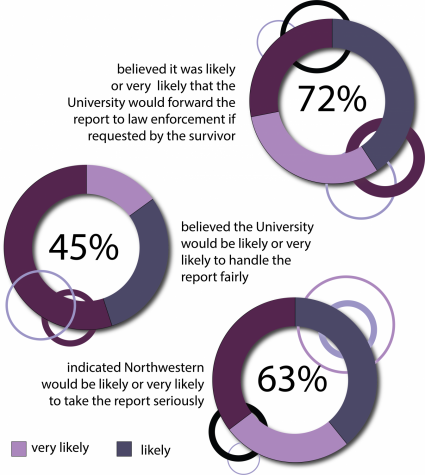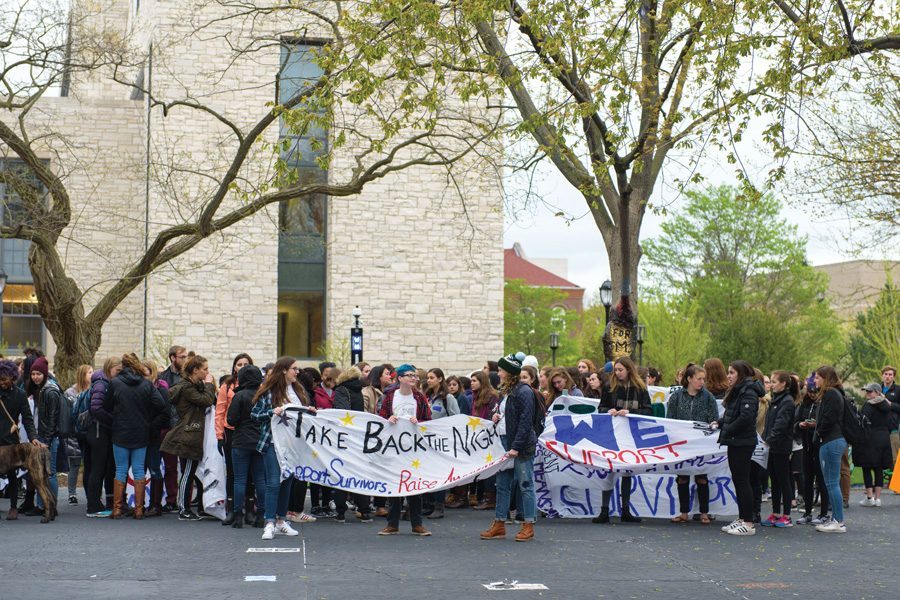Hoping for improved participation, University launches 2019 Campus Climate Survey
Daily file photo by Jeffrey Wang
Students protesting and raising awareness about sexual assault during an April 2017 march.
April 11, 2019
Northwestern launched its 2019 Campus Climate Survey Wednesday, as the University aims to improve prevention and sexual assault resources for students.
The survey will aid NU in learning more about student experiences of sexual assault on campus,
as well as provide information about other areas where the University is in need of improvement.
According to Carrie Wachter, the assistant director of Sexual Violence Response Services and Advocacy, the University’s objective in launching a survey of this nature is represented within its title.
“Our motivation is to literally gauge what the campus climate is around sexual violence,” Wachter said. “We want to know what is happening, who is being impacted, if it is disproportionately impacting marginalized populations and if people are able to access resources.”
Wachter said the information will aid the University in providing more targeted responses and catering more specifically to demonstrated student needs.
The University will release information acquired through the survey to the Northwestern community in the fall, according to an email from Patricia Telles-Irvin, the vice president for student affairs.
Climate surveys have become more common in recent years at college campuses, under pressure from the Obama administration and Education Department, the agency tasked with enforcing Title IX, the federal law barring gender discrimination in federally-funded schools.
This is not the first time Northwestern has attempted an assessment of this kind. The University previously launched a Campus Climate Survey in 2015, which prompted University initiatives to improve sexual assault resources and support services.

According to the a list of recommendations released after the survey, the 2015 survey results shaped the establishment of a “Deputy Title IX Coordinator for Prevention” at the University, as well as the centralization of responsibilities regarding reports of sexual violence and assault, among other developments.
However, participation in 2015 was extremely low — only 15 percent of NU students completed the survey. This year, the University has spearheaded outreach and awareness efforts in an attempt to increase participation.
NU’s Office of Equity has made efforts to include information about surveys in advertisements, presentations and screens across the Northwestern campus, Kate Harrington-Rosen, the office’s equity outreach and education specialist, told The Daily in an email.
Harrington-Rosen said the office has partnered with other Northwestern offices and student groups across campus to increase publicity opportunities through “social media, newsletters, and word of mouth.” Participating students will be awarded a $5 Amazon gift card.
Wachter said she hopes the Center for Awareness, Response and Education’s efforts to provide safe spaces for students to participate in the survey will also increase participation. Five different spaces will be provided for students, in which a CARE representative will be available to provide support for students throughout the survey period.
“We recognize that taking a survey like this is activating, for people who are either directly affected by sexual violence and even for those who are indirectly impacted,” Wachter said. “We want people to feel like they can talk to somebody throughout it or after it, or even to just have a quiet, safe space to go to, in the presence of someone who understands the impacts of trauma.”
Some students have already expressed a willingness to participate. Weinberg freshman Halle Petrie said the issue of sexual assault is frequently on her mind, and she appreciates having a space to express her thoughts.
“I know multiple people on campus who have been sexually assaulted,” Petrie said. “It’s a lot more common than people think. Just knowing that it really does happen to people around you is important, and I don’t think everyone knows that.”



